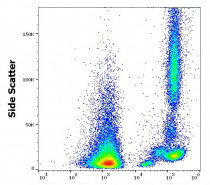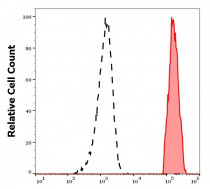ARG65495
anti-CD46 antibody [MEM-258] (azide free)
anti-CD46 antibody [MEM-258] (azide free) for Flow cytometry,Immunoprecipitation,Western blot and Human,Bovine
Immune System antibody
Overview
| Product Description | Azide free Mouse Monoclonal antibody [MEM-258] recognizes CD46 |
|---|---|
| Tested Reactivity | Hu, Bov |
| Tested Application | FACS, IP, WB |
| Specificity | The clone MEM-258 recognizes an epitope on SCR4 (the membrane-proximal SCR) domain of CD46 (Membrane cofactor protein). CD46 is 56-66 kDa dimeric transmembrane protein expressed on T and B lymphocytes, platelets, monocytes, granulocytes, endothelial cells, epithelial cells and fibroblast; it is negative on erythrocytes. |
| Host | Mouse |
| Clonality | Monoclonal |
| Clone | MEM-258 |
| Isotype | IgG1 |
| Target Name | CD46 |
| Antigen Species | Human |
| Immunogen | HPB-ALL human T cell line |
| Conjugation | Un-conjugated |
| Alternate Names | MIC10; TLX; CD antigen CD46; Trophoblast leukocyte common antigen; AHUS2; TRA2.10; Membrane cofactor protein; MCP |
Application Instructions
| Application Suggestion |
|
||||||||
|---|---|---|---|---|---|---|---|---|---|
| Application Note | WB: Under non-reducing condition. * The dilutions indicate recommended starting dilutions and the optimal dilutions or concentrations should be determined by the scientist. |
Properties
| Form | Liquid |
|---|---|
| Purification | Purification with Protein A. |
| Purification Note | 0.2 µm filter sterilized. |
| Purity | > 95% (by SDS-PAGE) |
| Buffer | PBS (pH 7.4) |
| Concentration | 1 mg/ml |
| Storage Instruction | For continuous use, store undiluted antibody at 2-8°C for up to a week. For long-term storage, aliquot and store at -20°C or below. Storage in frost free freezers is not recommended. Avoid repeated freeze/thaw cycles. Suggest spin the vial prior to opening. The antibody solution should be gently mixed before use. |
| Note | For laboratory research only, not for drug, diagnostic or other use. |
Bioinformation
| Database Links | |
|---|---|
| Gene Symbol | CD46 |
| Gene Full Name | CD46 molecule, complement regulatory protein |
| Background | CD46 (MCP, membrane cofactor protein) is a multifunctional cell surface transmembrane protein that binds and inactivates C3b and C4b complement fragments, regulates T cell-induced inflammatory responses by either inhibiting (CD46-1 isoform) or increasing (CD46-2 isoform) the contact hypersensitivity reaction. CD46 also serves as a receptor for several human pathogens (both bacteria and viruses), and its ligation alteres T lymphocyte polarization toward antigen-presenting cells or target cells, inhibiting lymphocyte function. CD46 is a protector of placental tissue and is also expressed on the inner acrosomal membrane of spermatozoa. |
| Function | Acts as a cofactor for complement factor I, a serine protease which protects autologous cells against complement-mediated injury by cleaving C3b and C4b deposited on host tissue. May be involved in the fusion of the spermatozoa with the oocyte during fertilization. Also acts as a costimulatory factor for T-cells which induces the differentiation of CD4+ into T-regulatory 1 cells. T-regulatory 1 cells suppress immune responses by secreting interleukin-10, and therefore are thought to prevent autoimmunity. A number of viral and bacterial pathogens seem to exploit this property and directly induce an immunosuppressive phenotype in T-cells by binding to CD46. [UniProt] |
| Research Area | Immune System antibody |
| Calculated MW | 44 kDa |
| PTM | N-glycosylated on Asn-83; Asn-114 and Asn-273 in most tissues, but probably less N-glycosylated in testis. N-glycosylation on Asn-114 and Asn-273 is required for cytoprotective function. N-glycosylation on Asn-114 is required for Measles virus binding. N-glycosylation on Asn-273 is required for Neisseria binding. N-glycosylation is not required for human adenovirus binding. Extensively O-glycosylated in the Ser/Thr-rich domain. O-glycosylation is required for Neisseria binding but not for Measles virus or human adenovirus binding. In epithelial cells, isoforms B/D/F/H/J/L/3 are phosphorylated by YES1 in response to infection by Neisseria gonorrhoeae; which promotes infectivity. In T-cells, these isoforms may be phosphorylated by LCK. |
Images (2) Click the Picture to Zoom In
-
ARG65495 anti-CD46 antibody [MEM-258] (azide free) FACS image
Flow Cytometry: Human peripheral blood cells stained with ARG65495 anti-CD46 antibody [MEM-258] (azide free) at 0.5 µg/ml dilution, followed by APC-conjugated Goat anti-Mouse antibody.
-
ARG65495 anti-CD46 antibody [MEM-258] (azide free) FACS image
Flow Cytometry: Separation of human lymphocytes (red-filled) from erythrocytes (black-dashed). Human peripheral whole blood stained with ARG65495 anti-CD46 antibody [MEM-258] (azide free) at 0.5 µg/ml dilution, followed by APC-conjugated Goat anti-Mouse antibody.
Clone References









